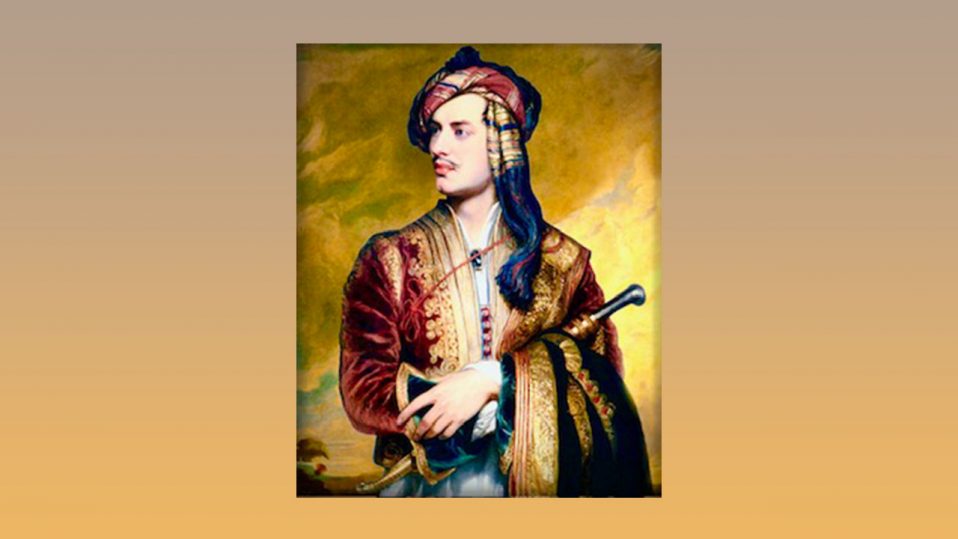Join us for EMBCA’s “200th Anniversary Commemoration of the Passing of Lord Byron” Webinar Panel Discussion on Sunday, May 26, 2024 at 2 P.M. EST/ 9 P.M. Athens EEST. The discussion will be introduced and moderated by Lou Katsos EMBCA’s President. The distinguished panel will include Dr. Katerina Lagos, Professor of History, Director, Hellenic Studies Program at California State University; Dr. Alexander Grammatikos of the Department of English at Langara College; Dr. Constantine G. Hatzidimitriou Adjunct Assit. Professor at St. Johns' University and City University; and Author/Poet Nicholas Alexiou, Professor of Sociology and Director of the Hellenic American Project at Queens College.
Lord Byron’s legacy transcends the boundaries of literature and extends into the realm of politics, activism, and cultural influence. As one of the leading figures of the Romantic movement, Byron’s poetry captured the imagination of readers across Europe with its themes of passion, rebellion, and longing for freedom. However, it is his involvement in the Greek War of Independence that truly solidified his place in history as a champion of liberty and a symbol of selfless dedication to a cause greater than oneself.
Byron’s journey to Greece in 1823 was not merely a poet’s whim but a deliberate choice to support the Greek people in their struggle against Ottoman rule. Motivated by a deep-seated belief in the principles of freedom and democracy, Byron threw himself wholeheartedly into the cause of Greek independence. His arrival in Greece was met with enthusiasm and hope, as his fame and fortune brought much-needed attention and support to the revolutionaries.
One of Byron’s most significant contributions to the Greek War of Independence was his financial support. He generously donated his own funds to finance the purchase of arms, ammunition, and supplies for the Greek fighters. Byron’s contributions were not limited to monetary aid; he also personally financed the construction and outfitting of a fleet of ships to aid the Greek navy in its struggle against the Ottoman forces.
Beyond his financial support, Byron’s presence in Greece served as a source of inspiration and morale for the Greek people. He immersed himself in the culture and society of Greece, learning the language and customs of the people he had come to support. Byron’s willingness to live and fight alongside the Greek revolutionaries endeared him to the local population, who saw him as a true friend and ally in their struggle for freedom.
Lord Byron’s presence in Mesolongi during the Greek War of Independence left an indelible mark on both the poet and the town. Mesolongi, a strategic stronghold for the Greek revolutionaries, became the stage for Byron’s passionate support for the Greek cause. Tragically, Byron’s time in Greece was cut short by his untimely death in 1824, at the age of 36. He succumbed to fever, a result of the harsh conditions prevalent in Greece at the time. However, Byron’s death only served to further immortalize him in the annals of history as a martyr for the cause of Greek independence.
Lord Byron’s legacy as a poet, activist, and philanthropist continues to resonate to this day. His unwavering commitment to the principles of liberty and justice inspired generations of writers, artists, and political activists around the world. In Greece, Byron is remembered as a national hero, whose sacrifices helped to secure the country’s independence and freedom. His legacy serves as a reminder of the power of individuals to make a difference and the enduring importance of fighting for what is right, no matter the cost.
The East Mediterranean Business Alliance/EMBCA remember’s/never forgets Lord Byron words, "I dreamed that Greece might still be free; For standing on the Persians’ grave, I could not deem myself a slave." in his famous poem “The isles of Greece” and that he died at Missolonghi trying to regenerate that poetic dream into reality.
THE ISLES OF GREECE by Lord Byron
The isles of Greece, the isles of Greece!
Where burning Sappho loved and sung,
Where grew the arts of war and peace,
Where Delos rose, and Phoebus
sprung!
Eternal summer gilds them yet,
But all, except their sun, is set...
The mountains look on Marathon--
And Marathon looks on the sea;
And musing there an hour alone,
I dreamed that Greece might still be free;
For standing on the Persians' grave,
I could not deem myself a slave.
A king sat on the rocky brow
Which looks o'er sea-born Salamis;
And ships, by thousands, lay below,
And men in nations--all were his!
He counted them at break of day--
And when the sun set, where were they?
And where are they? And where art thou?
My country? On thy voiceless shore
The heroic lay is tuneless now--
The heroic bosom beats no more!
And must thy lyre, so long divine,
Degenerate into hands like mine?
'Tis something, in the dearth of fame,
Though linked among a fettered race,
To feel at least a patriot's shame,
Even as I sing, suffuse my face;
For what is left the poet here?
For Greeks a blush--for Greece a tear....
Fill high the bowl with Samian wine!
Our virgins dance beneath the shade--
I see their glorious black eyes shine;
But gazing on each glowing maid,
My own the burning teardrop laves,
To think such breasts must suckle slaves.
Place me on Sunium's marbled steep,
Where nothing, save the waves and I,
May hear our mutual murmurs sweep;
There, swanlike, let me sing and die:
A land of slaves shall ne'er be mine--
Dash down yon cup of Samian wine!

EMBCA is an organization exempt from Federal Income Tax under Internal Revenue (IRC) Section 501(c)(3), classified as a public charity, and qualifies to receive tax deductible bequests, devises, transfers or gifts under Section 2055, 2106, or 2522 . Donors can deduct contributions they make under IRC Section 170. Thank you all again for your continuing enthusiasm and support of our events !!

